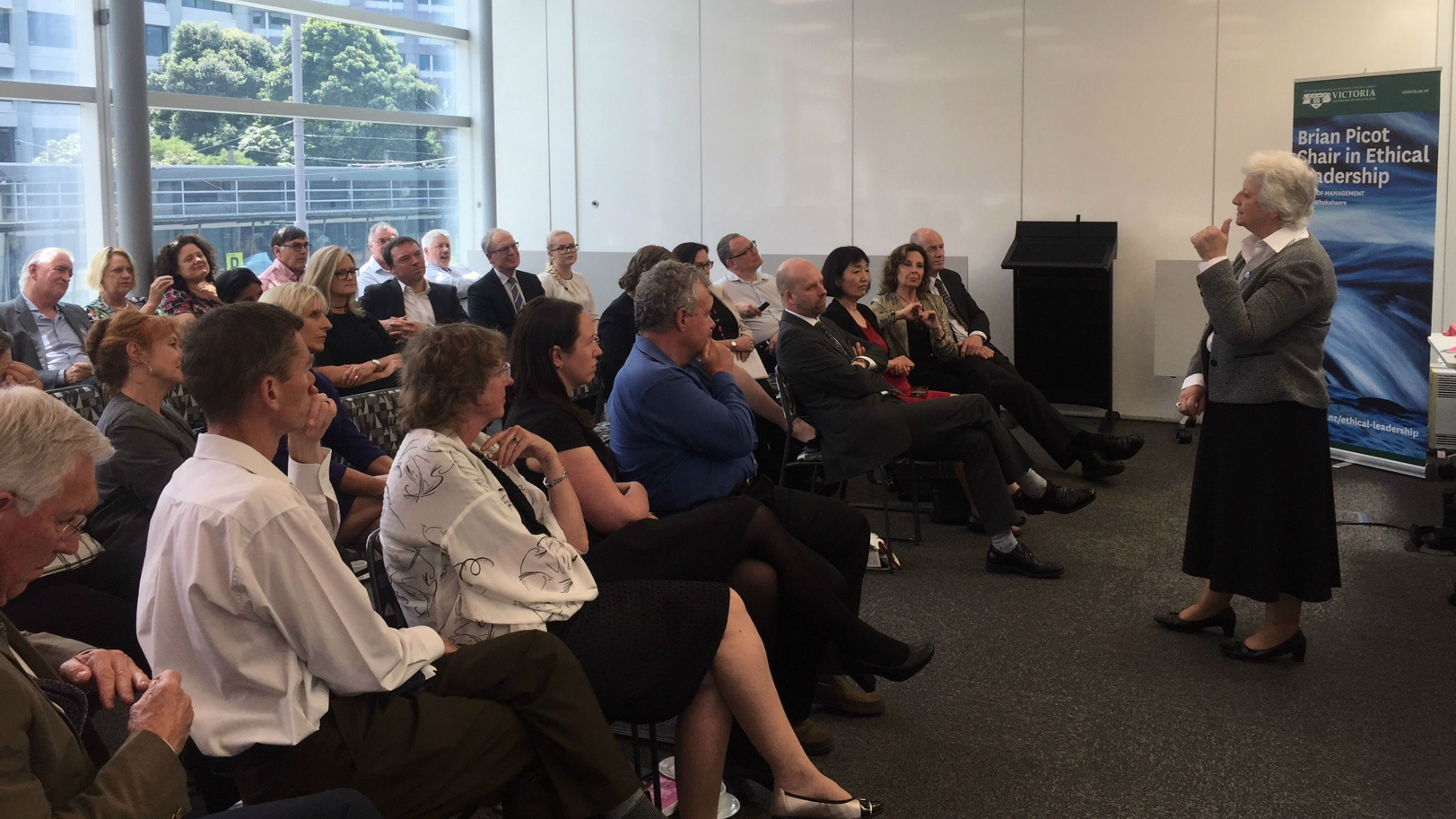Speaking up!
On 29 November 2017, Philippa Foster Back CBE, Director, Institute of Business Ethics, London presented a seminar about why speaking up is good for business.

Setting the Tone: a New Zealand perspective on ethical business leadership is the first report to be conducted in New Zealand by the United Kingdom’s Institute of Business Ethics (IBE). Some of the findings were presented during the public seminar.
The importance of promoting an open culture where employees feel able to speak up about issues without fear of retaliation is one of the key themes in a report that surveys New Zealand board chairs and chief executives about their views on ethical business leadership.
The seminar heard that the question of open culture "is absolutely paramount at the moment".
"We are all seeing so many cases of 'Why didn't somebody say something, everybody knew?'," said Foster Back.
“It's those sort of things that keep coming up. We hear it time and time again coming out of Hollywood, we’ve heard it coming out of Westminster, we've heard it coming out of all sorts of places […],
"So you have to ask, 'Why?', and that action really is where leadership comes in, trying to promote and make sure that people feel comfortable about speaking up."
Using the phrase 'speaking up' is in itself important, said Foster Back, noting several leaders in the report said New Zealand is "not a natural whistleblowing country".
'Whistleblowing' is "a very negative term", she said, whereas 'speaking up' is "all about encouraging people, about openness of culture. But the problem is, what do you call somebody who has spoken up? A whistleblower. There is not yet any other word that works".
Ethical business leadership
The 60-page report, written by IBE New Zealand Associate Jane Arnott and London-based Senior Researcher Guendalina Dondé, aims "to provide an overview of thought leadership amongst business leaders and highlight some of the practical applications of business ethics in New Zealand."
Milford Asset Management Executive Director Brian Gaynor, Air New Zealand and Fisher & Paykel Healthcare Chairman Tony Carter and Icebreaker Chairman Rob Fyfe are among 24 leaders interviewed from organisations ranging in both size and sector.
Interviewees were selected on the basis of their mana and achievements.
Along with promoting an open culture, other key themes are that ethical business leadership goes beyond compliance with the law and that it supports individual decision-making.
"Business success cannot be achieved through a culture of fear or control, or ticking boxes on what to do or not to do. It has to be grounded in core values and in an ethical culture," says the report.
"Ethical business leaders encourage people to make their own decisions, taking into account organisational values. Creative problem solving, reasoning and discretionary judgement based on ethical values needs to replace blind obedience.
"This gives employees the confidence to deal with situations that are not specifically covered in the 'rulebook' and supports the belief that ‘doing the right thing’ is the right thing to do."
Interviews show that business relationships and interactions with external partners and stakeholders are seen as a particularly complex area to tackle, with a stronger expectation now that supply chain issues will be monitored and addressed.
"As New Zealand seeks to generate greater economic gain through free trade agreements, this makes ethical business leadership central to ensuring consistent standards of behaviour and encouraging a sense of shared values throughout the countries and cultures in which an organisation operates," says the report.
The IBE Business Ethics Framework says ethical values should sit alongside business values in the purpose, strategy, governance and decision-making process of an organisation.
Those values should be embedded into organisational culture through a code of ethics supported by communication and engagement, training and reinforcement, leadership and an environment that supports speaking up, and risk assessment, monitoring and accountability.
Values for a lot of organisations, especially small and medium-sized ones, might be implicit but not written down, said Foster Back.
"But we’re in a different employment world now where actually people do need to sit down and say, 'How do we want to do our work?', and getting this combination of business values and ethical values together is what gives it the strength."
Requirement for a code of ethics
Having a code of ethics is now a requirement for listing on the New Zealand Stock Exchange.
"The Financial Markets Authority is reinforcing this stance and the professions at large are beginning to evaluate how auditing organisational culture can contribute to providing the level of insight that enables investor confidence," says the report.
The IBE has a library of about 300–400 codes and the word that comes up most often is 'integrity'.
"It is essentially matching words with actions," said Foster Back. "But also, if you think about it, the building industry and architects talk about buildings having integrity. If they don’t they tend to collapse."
The wording of codes has changed over the years, she said.
"'Responsibility' was very prevalent in UK codes written in the early 2000s on the back of the corporate responsibility movement, and what we’re now seeing coming through is 'courage'."
There is a debate about 'openness' and 'transparency' and which is most appropriate.
"In the IBE, we tend to favour 'openness' because it's a more engaging word and also within most corporate commercial environments it's very difficult to be fully transparent."
The final stages of the IBE Business Ethics Framework present the fruits of having created an open, responsible culture, which include enhanced trust and reputation and improved financial and operational performance.
